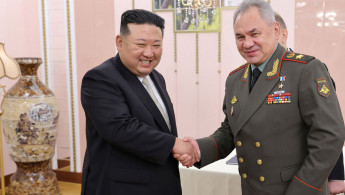US says North Korea will 'pay a price' for any weapons supplies to Russia
Arms negotiations between Russia and North Korea are actively advancing, a US official said on Tuesday and warned leader Kim Jong Un that his country would pay a price for supplying Russia with weapons to use in Ukraine.
Providing weapons to Russia "is not going to reflect well on North Korea and they will pay a price for this in the international community," US national security adviser Jake Sullivan told reporters at the White House.
The Kremlin said earlier on Tuesday it had "nothing to say" about statements by US officials that Kim planned to travel to Russia this month to meet President Vladimir Putin and discuss weapons supplies to Moscow.
Kim expects discussions about weapons to continue, Sullivan said, including at leader level and "perhaps even in person."
"We have continued to squeeze Russia’s defense industrial base," Sullivan said, and Moscow is now "looking to whatever source they can find" for goods like ammunition.
"We will continue to call on North Korea to abide by its public commitments not to supply weapons to Russia that will end up killing Ukrainians," Sullivan said.
On Monday, US National Security Council spokesperson Adrienne Watson said Kim and Putin could be planning to meet, and the New York Times cited unnamed US and allied officials as saying Kim plans to travel to Russia as soon as next week to meet Putin.
Asked if he could confirm the talks, Kremlin spokesman Dmitry Peskov said: "No, I can't. There's nothing to say."
As Russia's isolation over its war in Ukraine has grown, it has seen increasing value in North Korea, according to political analysts. For North Korea's part, relations with Russia have not always been as warm as they were at the height of the Soviet Union, but now the country is reaping clear benefits from Moscow's need for friends.
Moscow-Pyongyang defence cooperation
A North Korean defense ministry official in November said Pyongyang has "never had 'arms dealings' with Russia" and has "no plan to do so in the future."
Moscow and Pyongyang have promised to boost defense cooperation.
Russia's Defence Minister Sergei Shoigu, who visited Pyongyang in July to attend weapons displays that included North Korea's banned ballistic missiles, said on Monday the two countries are discussing the possibility of joint military exercises.
"Just as you can tell a person by their friends, you can tell a country by the company it keeps," said Keir Giles, Senior Consulting Fellow with Chatham House's Russia & Eurasia Programme. "In Russia's case, that company now consists largely of fellow rogue states."
The trip would be Kim's first visit abroad in more than four years and the first since the coronavirus pandemic.
While he made more trips abroad than his father as leader, Kim's travel is often shrouded in secrecy and heavy security. Unlike his father who was said to be averse to flying, Kim has flown his personal Russian-made jet for some of his trips but US officials told the New York Times that he may take an armored train across the land border North Korea shares with Russia.
Kim is likely to want to emphasize a sense of Russian backing, and may seek deals on arms sales, aid, and sending laborers to Russia, said Andrei Lankov, a North Korea expert at Seoul's Kookmin University.
The United States in August imposed sanctions on three entities it accused of being tied to arms deals between North Korea and Russia.
North Korea has conducted six nuclear tests since 2006 and had been testing various missiles over recent years.
Russia has joined China in opposing new sanctions on North Korea, blocking a US-led push and publicly splitting the UN Security Council for the first time since it started punishing Pyongyang in 2006.
(Reuters)





 Follow the Middle East's top stories in English at The New Arab on Google News
Follow the Middle East's top stories in English at The New Arab on Google News


